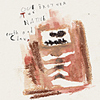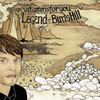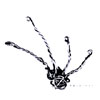- Administrator
- Albums and Singles
 A late-period Force Tracks artist aids in resuscitating this once feared lost patient, though like many stroke or heart attack survivors, life after near death is never quite the same.
A late-period Force Tracks artist aids in resuscitating this once feared lost patient, though like many stroke or heart attack survivors, life after near death is never quite the same.Read More
- Administrator
- Albums and Singles
 CocoRosie has spread its seed and this is the result. This trio of musicians try to separate themselves from their obvious influences, but fail at doing so just before putting me to sleep. It's an effort staying awake from beginning to end and not because it's a relaxing listen.
CocoRosie has spread its seed and this is the result. This trio of musicians try to separate themselves from their obvious influences, but fail at doing so just before putting me to sleep. It's an effort staying awake from beginning to end and not because it's a relaxing listen.
Fat Cat
I'm going to have a child one day and by the age of three it could potentially help me record a very hyped record. It would only sing, perhaps laugh and cry, and maybe shake a few percussive instruments, but it would be enough to meet the aesthetic needs Our Brother the Native and other bands they resemble. Take some minimalist composition, acoustic guitars, a rattle or two, and then toss in lazy, inexpressive vocals for a stew of finely layered boredom.
Tooth & Claw has all of the ingredients necessary to stir up the interest of all the pseudo hippies worshipping at the feet of Animal Collective and everything they do. That, in itself, is enough to wreck the album. The group worked so hard to give the album a free and flowing sound that in the end is nearly falls apart in the attempt to sound earthly or something else ridiculously comparable. I'm not sure if the band thought they could summon the earth mother and win the adoration of the music-buying public by recording a dull album or not, but in the end that seems to be what they've done. Derivative is an old word, but if I could pretend it weren't then I'd say the origin stems from the release of this album in some way.
After a few listens it becomes evident that the guitar (the same guitar used throughout ad nauseum) is pretty in and of itself, but that ultimately it doesn't matter because it never really expresses anything, never stands out on the record. It'd be nice if Our Brother the Native understood dynamics on a level that wasn't confined to the innards of a song because the whole album sounds as bad as Kansas looks flat. Drive across Kansas sometime, in fact, and the way this album sounds will become perfectly clear: it's featureless, annoyingly cute (or tries to be), and devoid of any inspirational features or original concepts across the board.
samples:
Read More
- Gary Suarez
- Albums and Singles
Never reaching the higher BPMs of the most memorable cuts from that Ben Gibbard / Jimmy Tamborello project's Give Up, Uphill Racer's debut for German electronica label Normoton finds its strength in cognizant structures, in welcome familiarity as opposed to post-new wave gimmickry. Dreamy emo warmth laminates these quite accessible tracks, with the essential ingredients of acoustic guitar, trembling chorus-laden singing, light piano tinkling, and soft rock rhythms on proud display throughout.
Opener "The Fat Grin Of The Enemy" sets the stage with a lively downer full of cryptic lyrics and well-timed musical peaks and valleys. "Burns First Dies First" soars with ornate strings and a fluid chorus that, while difficult to sing along to, rivals most of the empty gestured adult contemporary balladry plaguing the VH1 Top 20 Countdown. A shameless sample from sappy late '80s show The Wonder Years hits about two minutes into the nonetheless thrilling "Polarbear," and an equally cringeworthy one from Eternal Sunshine of the Spotless Mind kicks off "One Face Down," though these minor stumbling blocks don't damage the album all that much. The closer, an untitled "hidden" track, reprises themes explored in the prior 45 minutes, with odd field-recorded samples and less natural tones that create moods and break them as needed.
Charmingly sensitive enough to captivate the scruffy Williamsburg massive and those in the like-minded blogosphere, Uphill Racer's home listening tearjerker centerpiece will complement any post-break-up Sunday afternoon or Grey's Anatomy cliffhanger. Rest assured, Mom will dig it too.
Read More
- Administrator
- Albums and Singles
 Bryce Kushnier fuses his experiences in Winnipeg’s electronic and indie rock scenes for his latest full-length as Vitaminsforyou. A nod to a hill in Manitoba known for saving townspeople from 19th Century floods, the result is a huge, sprawling electropop epic showcasing the best of both worlds.
Bryce Kushnier fuses his experiences in Winnipeg’s electronic and indie rock scenes for his latest full-length as Vitaminsforyou. A nod to a hill in Manitoba known for saving townspeople from 19th Century floods, the result is a huge, sprawling electropop epic showcasing the best of both worlds.
The dam holding back Kushnier’s stockpile of ideas ruptures on this disc, overflowing every song and yet with remarkably little filler. The first real song on the album, "So Long Pleasant Bay," smoothly integrates field recordings, banjo, xylophone, and electronic beats. The song, like many of the others that follow, is frequently busy yet never crowded or cluttered and takes its time evolving structurally with little gratuitous repetition. On its heels is "The Ukrainians" featuring group vocals that come across like some odd, digital age town hall hootenanny. As with "Pleasant Bay," "The Ukrainians" seems to come from more of a rock background despite the electronic beats, but the songs that follow inch closer and closer to the dance floor. The strategy works, though, because even when the beats take the fore, the songs still retain plenty of warm, melodic dressing to heighten their appeal.
Not only do some of the arrangements evolve drastically as the songs progress, but Kushnier keeps the track sequencing from becoming predictable, too. The album opens with "I Move," a tape recorded conversation, and has intermittent surprises like the phone messages from friends on "A Call From Curtis," "A Call From Ghislain," and "A Call From Emm," or the experimental "Everything Is Always." Similarly, "Welcome to Echo Valley, Saskatchewan" is an unusual track of electronic warbling while "When We Were Young" consists of fuzzy ambience.
Despite the disparity between some of these musical styles, the album holds together with a surprisingly tight and consistent weave. I’m not always crazy about Kushnier’s shy voice or some of the serviceable lyrics, but these are easy to ignore since there’s so much more going on in these songs that draws my interest. Strangely enough for an album over an hour long with almost twenty tracks, there are few missteps and no outright duds on this disc. Although there are many pop elements within, that none of the songs is perfectly polished for mass consumption is one of its many charms.
samples:
 
Read More
- Administrator
- Albums and Singles
 Veteran producer Sherard Ingram, perhaps best (un)known as the mysterious Drexciyan DJ Stingray, drops a full length of delectable abrasive electro that honors the memory of James Stinson while challenging conventions and often experimenting wildly.
Veteran producer Sherard Ingram, perhaps best (un)known as the mysterious Drexciyan DJ Stingray, drops a full length of delectable abrasive electro that honors the memory of James Stinson while challenging conventions and often experimenting wildly.Read More
- Administrator
- Albums and Singles
 Nils Erga is absent and gone with him is his viola. In his place is Anders Hana, member of Ultralyd and Moha!, and some tight underwear presumably hugging a woman's ass. Hana has some big shoes to fill with Erga gone, but manages to make great use of his guitar, summoning electric freak outs to accompany the band's mucky delivery.
Nils Erga is absent and gone with him is his viola. In his place is Anders Hana, member of Ultralyd and Moha!, and some tight underwear presumably hugging a woman's ass. Hana has some big shoes to fill with Erga gone, but manages to make great use of his guitar, summoning electric freak outs to accompany the band's mucky delivery.
Load
The name Anders Hana scares me: I didn't like his solo release on Utech (it bored me to tears) and Moha! isn't a band to write home about. Each release demonstrated Hana's love for the guitar, but didn't showcase a single ounce of song writing talent. Noxagt, on the other hand, are precise and powerful. For all their energy and manic presentation, their music is beautifully arranged and written. It would seem, then, that Hana has found himself a home. Paired with the heart-attack-inducing, rhythmic convulsions of Kjetil D. Brandsdal and Jan Christian Lauritzen, Hana's guitar finally sounds fantastic. His love for the instrument brings the whole album home.
Brandsdal and Lauritzen still like to sound as though they're trying to fight themselves out of a paper sack with a chain-saw, but their sloppy, muggy chops are now highlighted by a guitar. At first the difference isn't readily apparent. Erga's viola work was magnificent, making the instrument sound natural in a setting it wouldn't normally be placed in. Replacing that sound with a guitar has its advantages, though, one of them being Hana's ability to let the instrument lead him as much as he leads it. Feedback, the light hum of strings being teased, and the shriek of an abused fret board figure heavily on this album, making it a rougher and more sizzling album than anything else in the band's discography.
The differences are not enormous, even if they become more obvious later. This album chugs more than their other records, it has more open space rather than more chaotic arrangements. Everything is much slower and more focused on timbre this time around. Noxagt remains the same in the most essential ways, Hana has simply entered to modify their presentation. Noxagt fans might be disappointed by the lack of viola power on this record, but Hana has finally proven he's a competent musician and band member. In the end, this is a tweak in the band's work that I suspect will birth more and different fruit in the future.
samples:
Read More
- Administrator
- Albums and Singles
 Dave Pajo has historically been known as the go-to man for guitar ability and sound: when Billy Corgan told Matt Sweeney "I want to get that guitar sound in Slint," Sweeney's reaction was simply, "Why don't we just get the guitarist from Slint?" On his second release under his last name, Dave has taken things further and demonstrated he has mastered the technique of total songcraft, something deftly exhibited on Pajo but perfected here.
Dave Pajo has historically been known as the go-to man for guitar ability and sound: when Billy Corgan told Matt Sweeney "I want to get that guitar sound in Slint," Sweeney's reaction was simply, "Why don't we just get the guitarist from Slint?" On his second release under his last name, Dave has taken things further and demonstrated he has mastered the technique of total songcraft, something deftly exhibited on Pajo but perfected here.
Drag City
When I first saw his first self-led project live, Aerial M, David wouldn't even face the crowd, nevermind singing in front of a crowd. Over the years his vocals have become more prominent and here it seems like they're no longer just another instrument, but in the driver's seat of the song, taking front row center at times while an arrangement of organ, piano, and strings now accompany competant guitar, bass, and drumming. I have always been impressed with every step Pajo has taken along the way with the evolution of his own projects, but more than ever, he is showing his true talents as a fully-realized multi-faceted composer.
For the most part, David presents an album with a heaping amount of variety. Not only does he show that he can do Beatle-esque blues and power pop with songs like "We Get Along, Mostly" and "Foolish King," but he even makes a kind of nod to the old Aerial M days with the instrumental "Insomnia Song." Most of the first half of 1968 is very dark, subject wise, despite the bright, white cover and lush, elegant booklet. "Who's That Knocking" opens the album with words like a very grim lullaby and musically it shifts between some contrasting movements without a weak spot in its nearly six minutes. "The Devil Wants His Revenge" comes up a couple times, adding more evidence to my theory that Pajo must have signed a pact similar to Robert Johnson's: Dave's just too damned talented.
Even though he has been spending much of his time recently in Brooklyn, he's almost more in touch with his country roots than he has ever been, comically singing about "hillbilly killers on the run" in "Wrong Turn," followed by a murder and cannibalism by a river story in "Cyclone Eye." Additionally, he makes a nod to the Papa M singles series (the One, Two, Three,... EPs where songs were recorded at friends' places), however, where Papa M would include the collaboration of friends, "Walk Through the Dark," is a very introspective song with the recording made alone in a hotel.
The full sound returns for the endearing "Let It Be Me," and if there's a drum machine playing these beats on this or any of the other songs on 1968 (like it sounded like on Pajo), he's done a briulliant job of making them sound real nearly everywhere. "I've Just Restored My Will To Live Again," ironically ends the album on a very lyrically bright and optimistic note, completely contrasting the context of the song, recorded with only a simple guitar and voice on what's probably a very crummy, hand-held recorder.
1968 is very fluid, comfortable, and full sounding, and it's time that David Pajo isn't just "that guy who played with Tortoise, Stereolab, Royal Trux, Zwan, and Slint" (and that alone wouldn't be a bad way to be known) but regarded for his own strengths as an excellent composer and arranger.
samples:
Read More
- Administrator
- Albums and Singles
Read More
- Administrator
- Albums and Singles
 Barbara Morgenstern's whirlwind world tour inspired themes of changes and the nature of time on her first album since 2003's Nichts Muss. Her arrangements are frequently minimalistic, yet she strikes a delicate balance between warmth and precision that indicates a maturation of her pop sensibilities.
Barbara Morgenstern's whirlwind world tour inspired themes of changes and the nature of time on her first album since 2003's Nichts Muss. Her arrangements are frequently minimalistic, yet she strikes a delicate balance between warmth and precision that indicates a maturation of her pop sensibilities.
Exposure to new cultures informs the observation of the title track, an incantation that’s more piano than electro. That balance is rectified with the addictive “The Operator,” one of the album’s singles. Beat-friendly, its chorus is alluringly bittersweet in its reflection of constant motion even as it seems a little out of place among the album’s less frenetic material. The electronics are on equal footing with her piano playing when Morgenstern slows down on “Polar” and “Das Schöne Einheitsbild,” supplementing her melodies with blips and rhythms that prevent the songs from straying completely into unadorned singer-songwriter territory.
Morgenstern does a good job of keeping things fresh with changes in mood and instrumentation. On “Juist,” a slower instrumental, she brings in distorted elements that grab noticeable attention. Likewise, on “Alles Was Lebt Bewegt Sich,” the fuzzed sounds belie the song’s pop sheen and slowly gain prominence. She returns to electronic beats on “Quality Time” and “Mailand” before closing with the melancholic “Initials B.M.” The countries she visited on tour may not reflect so much in the music itself, but appear instead in her lyrics. “Die Japanische Schranke,” for instance, refers to a squeaky railway gate she encountered in Tokyo while “Unser Mann Aus Hollywood” is a story about an unhappy dream. In addition to the songwriting itself, one of Morgenstern’s strengths is her voice, which is pleasant to hear whether singing solo or with her own backing harmonies.
A few of the tracks could stand to be shortened, but that’s only a minor complaint for such an accomplished and satisfying album.
samples:
Read More
- Administrator
- Albums and Singles
 Christian Kiefer’s latest album is a mostly instrumental exploration of the Russian revolution. Among other instruments, he uses guitar, strings, and field recordings to create a stunning work both vivid and haunting in its cinematic evocations.
Christian Kiefer’s latest album is a mostly instrumental exploration of the Russian revolution. Among other instruments, he uses guitar, strings, and field recordings to create a stunning work both vivid and haunting in its cinematic evocations.
Kiefer sets the scene with "Yurovsky’s Lament," a mysterious and melancholic foreshadowing of events to come with its swooping drones and ominous guitar. Chirping crickets crossfade into the next track, one of the many layers of field recordings that lend the music a visual quality. Likewise, the closing latches or doors of "On Suffering Grief," the birdsong, the barking dog, and the mimicked horse trots of "Dubinushka," as well as the radio intercepts of "The Politburo Dreams of the Urals" can’t help but fire my imagination as if I’m listening to a film that’s playing in the next room, yet these subtle elements never overshadow the songs themselves. The music does its part to further the narrative with the snappy percussion of "The Firing Squad" or the peaceful "Koptyaki Road, Night."
It’s not all gloom and sadness here, either. In addition to the calm of "Koptyaki Road," "Kalmykov (Poppies)" unfurls into a stately—if not optimistic—supplication. Even "On Suffering Grief" reflects a carefully ordered worldview of acceptance rather than tragedy or betrayal. The only vocals on the album come on the interpretation of a Russian folk melody, "Troika." On it the harmonizing vocals are accompanied by drums that could signal both a death march and gunshots in the album’s harrowing finale.
Kiefer does a remarkable job of shifting moods and atmosphere to maintain the album’s energy, wrapping me in a dream with several signposts but few absolutes, ensuring a different imaginative landscape with each listen.
samples:
 
Read More
- Administrator
- Albums and Singles
 Another outstanding mini-release from Newcastle’s Jazzfinger collides with another undeniably gorgeous piece of Low Point artwork. Rarely do things that look this good, sound the same. Playing as both their standard duo, and expanded trio team, this two tracker 3" CD-R reveals further facets to their sound.
Another outstanding mini-release from Newcastle’s Jazzfinger collides with another undeniably gorgeous piece of Low Point artwork. Rarely do things that look this good, sound the same. Playing as both their standard duo, and expanded trio team, this two tracker 3" CD-R reveals further facets to their sound.
The duo piece, "The Shadow Between Two Worlds", takes an 11rpm vinyl crackle that trickles through a wall of muggy air. Heavy static drafts attempt to conceal contact mic'd minimalism where there appears to be a great distance moved in-between the song and the aural foreground. Intense burbles of something are halted by mini-sized screeching frequency raids, kicking in doors and knocking down tables. Even as it becomes overtaken by insistent feedback it remains grounded instead of imploding into wankery.
Half as long and more than twice as sharp, "Maypole" has the sound of a more audible interaction process that involves the hands of humans. Playing as a trio, they incorporate floating member Ben Wilkinson and his input into a harsher skewering sound. Offering up an underpinning buzz of what could either be a flypaper buzz or a far-flung off-mic vocal, this is the band at their most spikey and trebly yet.
samples:
 
Read More

